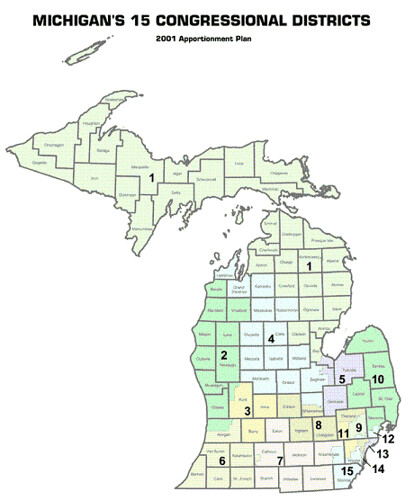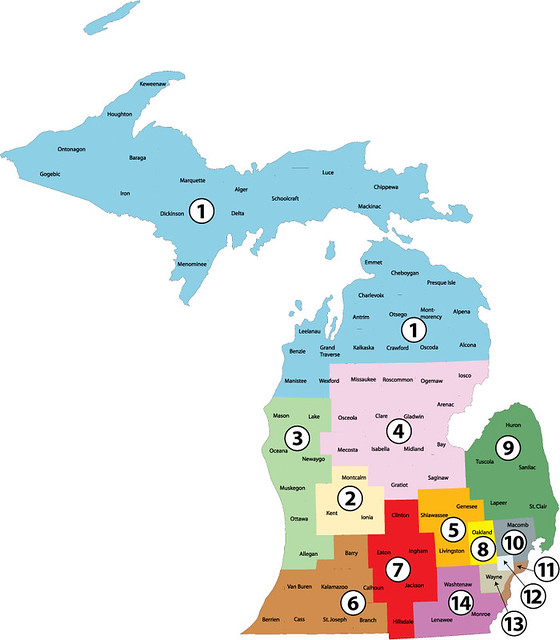Congressional Redistricting in Michigan: Playing Musical Chairs in 2012
xml:namespace prefix = lj /Poll Michigan redistricting
Crossposted to Daily Kos and Michigan Liberal.

Bid the above map farewell. In 2012, that map will look very different, as it will have one fewer congressional district.
As Jack Lessenbery explained on Michigan Radio:
Well, we finally have the official census figures, and for the first time in history, Michigan lost people in the course of a decade. Worse, we’ll have fewer members of Congress.
Join me over the fold for a reasonable solution, what will likely happen instead, and other bad news for the Great Lakes State from the 2010 U.S. Census.
Jack Lessenberry had more to say in Dome Magazine.
Michigan was the only state in the union to actually lose population. Hardscrabble West Virginia, bleak North Dakota and backwards Mississippi added people. Even Washington, D.C., which has been shrinking for decades, grew this time.
But not the state that put the world on wheels. The U.S. Census counters found 54,804 fewer Michiganders than a decade before. While that’s the first decline in state history, it doesn’t look large - only about half a percent of the state’s population.
The falloff from mid-decade, however, was much sharper. Michigan had several hundred thousand more people before the bottom fell out of the auto industry two years ago, after which the unemployed left for Texas - and new college graduates headed for Atlanta, Chicago, Portland, or wherever jobs could be found.
Less people means less money from Washington, and it also means less national clout.
Watch this segment from WOOD-TV8 in Grand Rapids for what "less national clout" means.
Scary, but pretty much unavoidable, given what happened to the state.
As for the loss of a congressional seat, that was foreseen well in advance. Craig Ruff of Dome Magazine not only predicted it back in 2009, he even decided to see what kind of sane redistricting plan would best deal with the situtuation.
Following the 2010 census, Michigan likely will lose one of its 15 seats in the U.S. House of Representatives. The state legislature and governor or courts will decide how to collapse 15 districts into 14. It is, therefore, anyone’s guess as to which congresspersons see their districts remain pretty much intact, somewhat reconfigured, greatly reconfigured, or evaporate.
Having dabbled in the past with redistricting options, I can hardly resist taking a premature stab at how boundaries could change following the 2010 census.
My criteria in sketching out 14 new congressional districts are:
Here's the map he came up with.

This is a fairly even-handed redistricting, as it negatively affects both Democrats and Republicans.
Among the Democrats who will face hardship, Sander Levin loses his base in southeastern Oakland County to Conyers and has to compete in Macomb County, which is much more Republican. Also, Dale Kildee's district would be much competitive. Both could lose in 2012
The Republicans would also face their share of problems. Thaddeus McCotter would have had his district torn asunder and have had to compete with John Dingell in a much more Democratic district. Marc Walberg's second term might have been his last as he tries to win in a district that included Ann Arbor. While Mike Rogers would have kept his safe seat in Livingston County, the district that would have included Lansing would have been much more competitive, and could have elected a Democrat (Lance Enderle would have had a shot).
Of course, all the above makes too much sense, and just is not going to happen. As Sarah Kellog wrote in Dome Magazine:
As the state legislature begins redrawing Michigan’s electoral maps, Democrats will feel the frustration that comes with being out of power during redistricting. Michigan’s congressional Democrats may feel the pain even more acutely.
Folks, this is why state legislative races matter, especially in a year when the decennial census occurs.
More on what will actually happen in Lansing.
While the work is done on the state level, members of Congress have always played a crucial advisory role in deciding how their districts will be drawn. That will be especially important this cycle since Michigan is expected to lose a seat, dropping from 15 to 14.
The Republicans not only have the majority of the Congressional seats, they also have both houses of the state legislature, the governorship, and the majority of the state supreme court. This means that redistricting will favor the GOP, and one of the current Democratic incumbents will lose their seat. This happened in 2002, when both Lynn Rivers and David Bonior lost their seats, Rivers to John Dingell and Bonior to either Sander Levin or Candice Miller, depending on how one wishes to count the event.
On Michigan Radio, Jack Lessenberry outlined the scenarios.
Most likely, they will combine the southeastern districts now held by Gary Peters and Sandy Levin, forcing them to run against each other in the 2012 primary, unless one steps down.
They could also put John Conyers and John Dingell into a seat where they have to run against each other.
Elsewhere, they will try to pack as many Democrats as possible into as few districts as possible, while strengthening Republican incumbents.
Other possibilities include combining combining Levin and Conyers or making Kildee's district more competitive, both of which were outlined in Ruff's Dome article. A dangerous one would be combining Clarke and Conyers, which could run afoul of legal challenges. It might be easier to add more Republicans to Clarke's district.
Of course, the GOP-majority legislature might surprise all of us. They might try every single one of the above. I wouldn't put it past them.
So, which scenario do you think will happen? Be sure to vote in the poll.
Crossposted to Daily Kos and Michigan Liberal.

Bid the above map farewell. In 2012, that map will look very different, as it will have one fewer congressional district.
As Jack Lessenbery explained on Michigan Radio:
Well, we finally have the official census figures, and for the first time in history, Michigan lost people in the course of a decade. Worse, we’ll have fewer members of Congress.
Join me over the fold for a reasonable solution, what will likely happen instead, and other bad news for the Great Lakes State from the 2010 U.S. Census.
Jack Lessenberry had more to say in Dome Magazine.
Michigan was the only state in the union to actually lose population. Hardscrabble West Virginia, bleak North Dakota and backwards Mississippi added people. Even Washington, D.C., which has been shrinking for decades, grew this time.
But not the state that put the world on wheels. The U.S. Census counters found 54,804 fewer Michiganders than a decade before. While that’s the first decline in state history, it doesn’t look large - only about half a percent of the state’s population.
The falloff from mid-decade, however, was much sharper. Michigan had several hundred thousand more people before the bottom fell out of the auto industry two years ago, after which the unemployed left for Texas - and new college graduates headed for Atlanta, Chicago, Portland, or wherever jobs could be found.
Less people means less money from Washington, and it also means less national clout.
Watch this segment from WOOD-TV8 in Grand Rapids for what "less national clout" means.
Scary, but pretty much unavoidable, given what happened to the state.
As for the loss of a congressional seat, that was foreseen well in advance. Craig Ruff of Dome Magazine not only predicted it back in 2009, he even decided to see what kind of sane redistricting plan would best deal with the situtuation.
Following the 2010 census, Michigan likely will lose one of its 15 seats in the U.S. House of Representatives. The state legislature and governor or courts will decide how to collapse 15 districts into 14. It is, therefore, anyone’s guess as to which congresspersons see their districts remain pretty much intact, somewhat reconfigured, greatly reconfigured, or evaporate.
Having dabbled in the past with redistricting options, I can hardly resist taking a premature stab at how boundaries could change following the 2010 census.
My criteria in sketching out 14 new congressional districts are:
- Follow U.S. Census Bureau 2008 estimates of county population. In the case of Detroit and other cities, the last estimate took place in 2006.
- Protect the two minority-majority districts held by African Americans (Conyers and Kilpatrick) in the Detroit area.
- Split county lines as infrequently as possible.
- Keep districts relatively compact and, to the extent possible, provide some coherence to a single media market.
- Avoid partisan bias, but attempt to make some districts more competitive.
- Retain some semblance of existing districts to afford residents a basis of familiarity.
Here's the map he came up with.

This is a fairly even-handed redistricting, as it negatively affects both Democrats and Republicans.
Among the Democrats who will face hardship, Sander Levin loses his base in southeastern Oakland County to Conyers and has to compete in Macomb County, which is much more Republican. Also, Dale Kildee's district would be much competitive. Both could lose in 2012
The Republicans would also face their share of problems. Thaddeus McCotter would have had his district torn asunder and have had to compete with John Dingell in a much more Democratic district. Marc Walberg's second term might have been his last as he tries to win in a district that included Ann Arbor. While Mike Rogers would have kept his safe seat in Livingston County, the district that would have included Lansing would have been much more competitive, and could have elected a Democrat (Lance Enderle would have had a shot).
Of course, all the above makes too much sense, and just is not going to happen. As Sarah Kellog wrote in Dome Magazine:
As the state legislature begins redrawing Michigan’s electoral maps, Democrats will feel the frustration that comes with being out of power during redistricting. Michigan’s congressional Democrats may feel the pain even more acutely.
Folks, this is why state legislative races matter, especially in a year when the decennial census occurs.
More on what will actually happen in Lansing.
While the work is done on the state level, members of Congress have always played a crucial advisory role in deciding how their districts will be drawn. That will be especially important this cycle since Michigan is expected to lose a seat, dropping from 15 to 14.
The Republicans not only have the majority of the Congressional seats, they also have both houses of the state legislature, the governorship, and the majority of the state supreme court. This means that redistricting will favor the GOP, and one of the current Democratic incumbents will lose their seat. This happened in 2002, when both Lynn Rivers and David Bonior lost their seats, Rivers to John Dingell and Bonior to either Sander Levin or Candice Miller, depending on how one wishes to count the event.
On Michigan Radio, Jack Lessenberry outlined the scenarios.
Most likely, they will combine the southeastern districts now held by Gary Peters and Sandy Levin, forcing them to run against each other in the 2012 primary, unless one steps down.
They could also put John Conyers and John Dingell into a seat where they have to run against each other.
Elsewhere, they will try to pack as many Democrats as possible into as few districts as possible, while strengthening Republican incumbents.
Other possibilities include combining combining Levin and Conyers or making Kildee's district more competitive, both of which were outlined in Ruff's Dome article. A dangerous one would be combining Clarke and Conyers, which could run afoul of legal challenges. It might be easier to add more Republicans to Clarke's district.
Of course, the GOP-majority legislature might surprise all of us. They might try every single one of the above. I wouldn't put it past them.
So, which scenario do you think will happen? Be sure to vote in the poll.